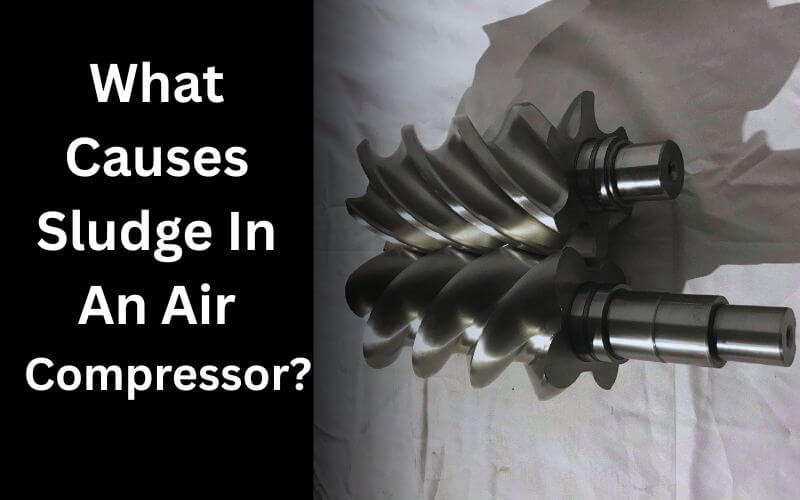Air Compressors come up in different types: oil and oil-less. With time, they need maintenance or replacement parts if they get damaged. Especially if you continuously use an oil-lubricated compressor for a long time, it gets affected by weather conditions and causes sludge. Having sludge in a compressor isn’t a good indication; it may damage the smooth working. Here we will discuss the main causes of sludge and its types.
3 Causes of Sludge on Your Air Compressor
The maximum performance of oil lubricated compressors depends on the quality of oil that is added to them. When the oil is not good, the tool will heat up quickly; its parts face friction and don’t freely move, which directly impacts the output (pressurized air) we get. When sludge starts appearing on the surface, you must change the oil, but first, we will learn about its causes.
1. Temperature
Moist air, dust particles, and hydrocarbons enter the air compressor when we use our air compressor for the long term. In certain situations, the compressor has to operate at high temperatures for pressurized air. With the time pressurized air, hydrocarbons and dust particles react with moisturized air, producing pollution of sediment called sludge.
Sludge stays in the air compressor and slowly damages its performance. It is a viscous lubricant containing dust particles and mixed impurities. When compressor components do their job, the sludge produces friction and may damage the parts.
To prevent it, we must drain our compressor at the right time; we should do maintenance and cleaning at least twice a year. It would be better to clean the compressor every 4-6 months.
2. Weather
Making sludge in an air compressor is a chemical breakdown of oil, but why does this process occur? Different breakdown factors include impurities, air temperature and moisturized air that react with compressor oil and cause sludge.
The weather never remains the same in some areas, sometimes it’s too cold to the freezing point, and sometimes it’s too much hot. Variations in weather affect all parts of your air compressor. It increases impurities in pressurized air, which makes sludge.
Rather than this, the hot weather directly affects the compressor as it increases the temperature; the pressurized air and hot weather both double the temperature, rapidly increasing impurities and causing sludge in the air compressor.
3. Faulty Filters
Filters are important parts of your compressor that keep the air filtered and block dust entry into the machine. This way, it protects the pressurized air and protects dust particles from damaging the normal job.
If the compressor has faulty filters installed, it will be unable to stop the dust entrance, which will cause sludge in an air compressor. If you take out sludge after a long time, then you will find
It is the same as a car engine; if you don’t change the oil for a long time, it will damage the engine and its performance. The same happens with the air compressor; if we don’t remove sludge, it will remain in our device, damaging the performance.
If you are thinking about how sludge will destroy the compressor and how components become faulty, imagine the components that need a good oil or lubricant, you put dust and impure oil on it, and over time it will produce friction. With this friction between two components, it will start noise and more load needed because now there is friction too compared to the new compressor motor with good oil.
So, you have to care for your tool properly and change the oil every 3 to 4 months; it will keep the sludge making chances less and increasing the compressor’s life.
Types of Sludge
It’s time to discuss types of sludge; sometimes, you have to see black and brown sludge in your compressor. Let’s go into details:
1. Black Sludge
Black sludge is produced due to the reaction of Sulfur with air impurities, but in the case of an air compressor, if we do not clean it for a long time, the sludge will be black. So, black sludge in your air compressor is only due to the duration of time and not properly caring for the compressor.
2. Brown Sludge
Brown sludge is also due to the same reason, but it is less duration time compared to black sludge. Black sludge is more dangerous for your compressor, while brown sludge will also affect compressors but not black sludge.
Before your air compressors start making brown or black sludge take a proper check-up; after reading our article, are you worried about sludge?
Tips To Prevent the Sludge
Tip 1: Clean oil
Always try to keep clean oil in your air compressor and fill it completely. Do not put any bad quality oil in your compressor.
Tip 2: Monitor
After some time, monitor if there is oil leakage from any compressor section and confirm it by dropping some soapy water on all the fittings. Quickly fix the leakage so it won’t affect the air compressor’s performance.
Tip 3: Sample
Take a sample of oil from the compressor, check the oil quality, see if the oil has started making sludge, and immediately change the oil with a high-quality oil.
Final Verdict
In this article, we hope you got enough information about sludge, what it is and how it is made in a compressor, and tips to prevent it. And we know you can keep your air compressor healthy to use it for more years. We will recommend always adding good quality oil to your compressor.

